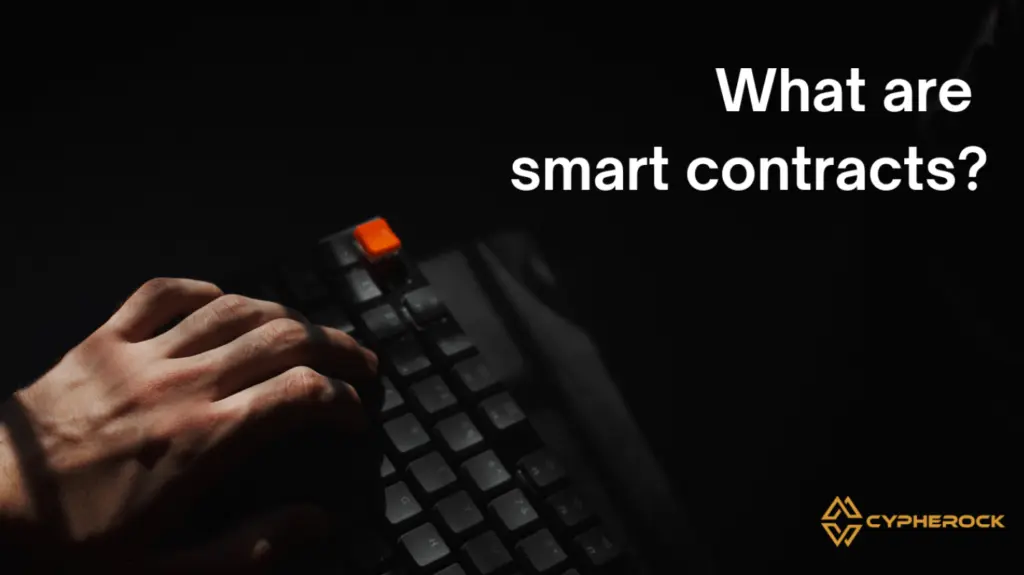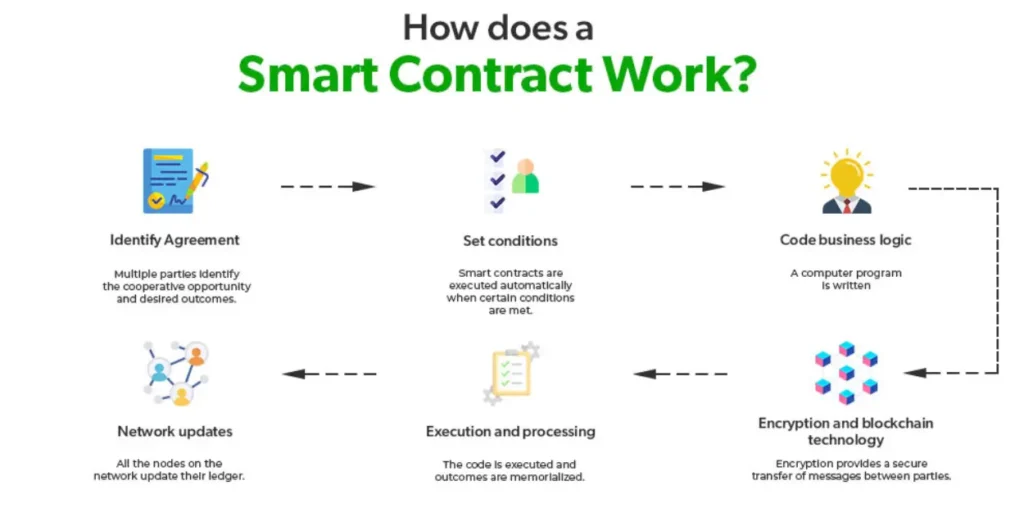

Smart contracts are pieces of code that live/get executed on decentralised blockchain networks. They are self-executing contracts that include terms of the agreement between two participating entities, buyer-seller, user-protocol, etc. Once deployed on the network, these contracts are non-destructible and non-editable.
Blockchain eliminates the need for intermediaries thus increasing overall efficiency and execution speed. Smart contracts have the potential to revolutionize the way that we enter into and execute contracts, as they provide a level of security and automation that is not present in traditional contracts.
In a nutshell, blockchain acts as a ledger that records transactions across a distributed network of nodes (computers), and smart contracts are a way to interact with that ledger.
Smart contracts are important because they provide a level of trust, transparency, and automation which is absent in traditional contracts. Since they are stored on a decentralised network, they are secure and immutable. Once the terms of the contract are laid out and agreed upon, none of the parties can tamper with them. Smart contracts also reduce the potential for disputes as the terms are transparent to everyone involved. Participating entities can verify the terms of the agreement before initiating the contract, thus reducing the need for manual intervention. Overall, smart contracts provide a more secure, trustless way to revolutionise the way agreements are fulfilled.
Smart contracts work by using blockchain technology to store the details and terms of the contract. Anyone can create a contract by paying the required gas/network fee in case of some networks, and by defining the terms of the contract in the form of code. Smart contracts work on the basic if-else logic while specifying the terms of the contract.
For example, if the buyer wants to buy a product, he/she needs to satisfy the payment terms set by the seller. Only once all the smart contract parameters have been satisfied, will the buyer receive the product which is listed in the contract by the seller.
Smart contracts use cryptographic technology to ensure the integrity and security of the contract. They can also be integrated with other technologies, such as oracles and APIs, to access external data and information. This allows the contract to be triggered by external events, such as changes in market prices or weather conditions.

Source: https://www.geeksforgeeks.org/smart-contracts-in-blockchain/
Smart contracts have numerous potential applications and are being utilized across various industries. Some examples include:
Important documents can be minted/added to the blockchain to preserve them from being tampered with in the form of NFTs (Non-fungible tokens), which are unique digital assets that can represent ownership of a wide range of assets, including digital art, collectibles, and even real-world assets.
Smart contracts enablesDeFi (Decentralised Finance) to allow permissionless financial features such as lending, borrowing, staking, etc. It opens up a world full of permissionless financial markets. They can also be used to maintain the value of a currency. For example, the DAI stablecoin utilizes smart contracts to maintain its dollar-pegged value.
Smart contracts can be used to simplify the process of voting and decision-making through on-chain governance abilities. They can also help to reduce costs and increase efficiency by automating processes and removing the need for intermediaries. This can be especially beneficial in industries such as supply chain management, real estate, and insurance where complex and time-consuming processes are involved.
Smart contracts can make the process of auctions seamless by removing the middleman in the bidding process. All the bids can be placed by calling the entry points and the winner can be decided by comparing the bid values.
Blockchain networks can also be used in the gaming industry to create in-game items which are truly owned by the player, thus enabling peer-to-peer trading of the in-game assets.
Healthcare - Smart contracts can be used to automate the process of sharing patient data among healthcare providers and insurance companies.
Another benefit of smart contracts is the ability to create decentralized autonomous organizations (DAOs). A DAO is a type of organization that utilizes code to govern operations and management. This allows for more efficient decision-making and can potentially reduce the risk of corruption or mismanagement.
Since every interaction with a smart contract is in the form of a transaction involving real money, users should take some precautionary measures. Here are a few best practices to follow:
In conclusion, interacting with smart contracts can be a safe and secure experience, as long as the necessary precautions are taken. This includes thoroughly reviewing the contract’s code and terms, ensuring that it has been audited by a reputable third party, and staying informed and up-to-date on the latest developments in smart contract security. By being vigilant and taking these steps, individuals can protect their assets and confidently participate in the world of smart contracts.

We are live for orders @ www.cypherock.com/product/cypherock-x1
Connect with us:
Twitter: @CypherockWallet
Telegram: Join the Community
